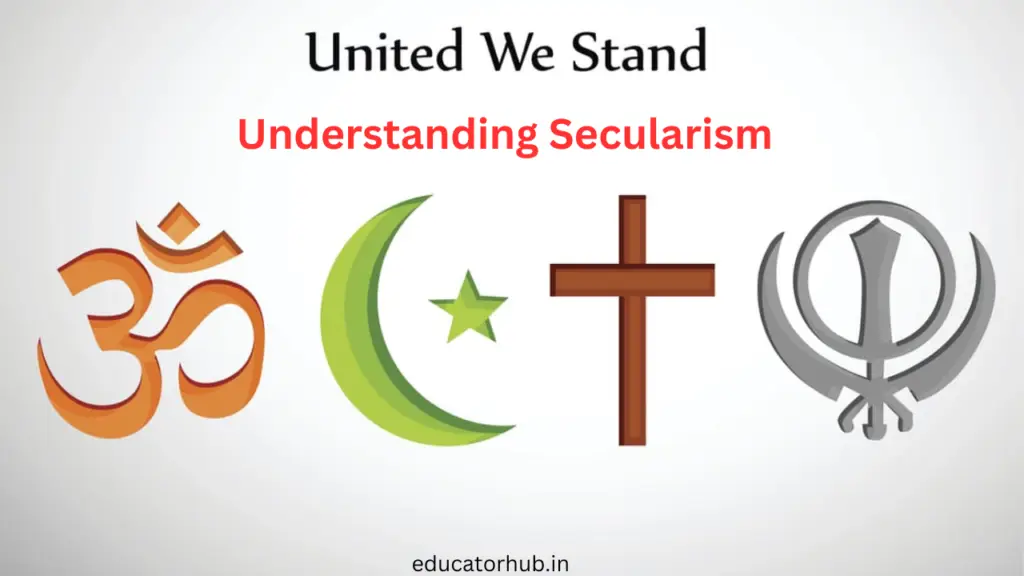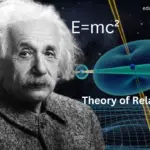
Introduction to Secularism
Secularism is a notion that seeks to disentangle political and social institutions from religious beliefs. Within a secular society, the policies of the state are not biassed towards any one religious belief system. Instead, all religions are treated equally and such a state maintains a neutral position on spiritual issues. Secularism is essential in fostering equality, tolerance, and harmony among people of different communities. This principle, in particular, is of great significance in multi-ethnic countries, where several religions exist in the same territory. Read about ‘Understanding Secularism : Meaning, Importance and Impact on Society’.
In this post, we will look at the concept of secularism, its origins, and the evolution of secularism in different societies. But first, let’s summarise secularism in a few basic conceptions, so that it does not become a broadly working term.
What is Secularism?
Secularism is a term broadly used to indicate a principle or ideology that promotes the exclusion of religious organisations and institutions from political power or national affairs. This entails that religion has no bearing on a state’s rules on conduct or any of its policies. In a secular state, the government’s relationship with its citizens is one of respect for religions and even the freedom of religion.
The essence of secularism is not to abolish faith in God, or to remove all manifestations of faith from society. It is rather intended to cultivate a society in which every individual is treated the same as every other person, irrespective of what religion they observe. Secularism affirms that discrimination, wars or superiority fairs avails no moral ground based on religion differences.
Also Read : How to Make Money Online
Read further ‘Understanding Secularism’…
Key Features of Secularism
- Religious Freedom : One major facet of secularism is that it does not pressure or persecute individuals against their religious practices. Everyone is free to pick or practise a religion or to choose none.
- Equality : The presence of secularism has mandated a degree of equality amongst the populace, regardless of how their religious tenets may differ.
- Neutrality of the State : Being non-religious approaches that no single religion is upheld in a secular society by the government.
- Separation of Religion and Politics : God or other religious figures do not run the Nations and God’s will is not a primary directive for any political organisation.
The History and Origins of Secularism
Secularism has not always existed, that is at least not in the form that we are accustomed to. In its earliest phases, the territory of Europe is where it began its rise towards becoming more widespread notoriety. The period between the 1670s and 1800s is when the progression began the most, and further details suggest that large pillars of European society such as French philosopher Voltaire and English philosopher John Locke advocated the separation of church and the state.
In addition, the American revolution and the French revolution which both occurred in the 18th century are both quite popular historic events with secular ideologies. These revolutions further solidified people’s beliefs that a government should be separate and not associate itself with organised religion.
Secularism in India has evolved into its core essence in every decision that is taken, post-independence. The nation adopted secularism to incorporate the plurality of faiths existing in the land.
Also Read : Full Detail About Indian Dowry System and Prohibition Law
Read further ‘Understanding Secularism’…
Why is Secularism Important ?
Secularism is a useful and essential tool in achieving social order in societies consisting of pluralistic populations. It upholds personal views and actions, encourages equity among citizens, and assists in averting disputes revolving around faith. So, why secularism is necessary:
1. Promotes Equality
Secularism will prohibit legal discrimination against any person in the name of religion. It would be quite difficult for people to exercise their freedom of religion in a secular society. This equality promotes harmony, cooperation, and regard for the different constituencies.
2. Protects Religious Freedom
Secularism gives one the choice to adhere to a religion or religion-free life. It safeguards belief by guaranteeing that the state does not enforce a prescribed religion. This is a prerequisite for a multicultural society where individuals profess a variety of faiths.
3. Prevents Religious Conflicts
If the public authority people tend to the plight of only one religion, it creates societal rifts and animosity. Secularism ensures that all religions are treated fairly and that the government does not adopt a political viewpoint, which helps limit the scope of religious fidelity-related disputes.
4. Ensures a Fair Legal System
Secularism maintains that laws are made according to logic, morals, and social justice rather than religious conviction. The approach leads to a more just legal system in which individuals’ judgments are based on what they do and not on what religion they profess.
Also Read : Articles a an the in english : Read full detail
Read further ‘Understanding Secularism’…
Different Models of Secularism
Secularism does not always mean the same in every country. The differences can be based on historical, cultural, or political factors of the particular country. Let’s take a few examples of secularism:
1. Strict Secularism
In nations such as France, secularism is very explicit. There is a very clear distinction maintained in the French government between religion and the state. So, for example, headscarves or crosses are usually not allowed in schools and offices, which are public institutions. This model intends to exclude all influences of religion from the sphere of public life.
2. Inclusive Secularism
In the case of India, this is not the case as it is a more integrative form of secularism. Such a government recognizes all religions and allows people to profess their beliefs without fear. In India’s secularism, no religious community can dominate over another and everything linked to their practices will be honoured. The government does not encourage a specific religion but does endorse the practice of religion in public.
3. American Secularism
For most in the United States, the tenet of secularism implies ‘freedom of religion,’, ‘not the freedom from religion. It’s important to note that the criterion for uniting arms of government and church acknowledged the fact that the constitution is in general referred to as the supreme law. Within this framework, secularism is defined as the separation of organised religion from politics, which is the separation of church and state. In a broad sense, it means that the armed forces of organisations are neutral, that is, they allow people to practise their faith, but do not establish an official religion. Practising faith is generally thought acceptable in politics, however, there is no ‘official faith’. This type of secularism allows for the separation of religions from society, however, it does acknowledge the positions of religious institutions.
4. Weak Secularism
There are differences between countries that enjoyed such flawless separation and those that never actually achieved such a status. This is because devotion to faith in everyday affairs can hardly exist without religious groups closely intertwined with a government structure. Despite there being no secularism constitutionally mandated, the presence of religious groups in churches is apparent throughout the countryside of many empires.
Also Read : Active Voice And Passive Voice : Full Explained With Examples
Read further ‘Understanding Secularism’…
Advantages of Secularism
Society too reaps from the scratch of secularism. Let us enumerate some of the most pronounced benefits:
1. Fosters Social Unity
Secularism creates coherence and binding glue between people by ensuring that all religions are treated equally. The ability to coexist with others in mutual respect for beliefs is when people feel secure.
2. Protects Minority Rights
A secular state does not allow discrimination or dominance of one over the other. Within the corridor walls, all forces that exist interact in harmony without secularism. This protection is essential for fostering a balanced society.
3. Promotes Rational Decision-Making
A secular government is not one ruled by religion, rather they make decisions by reasoning, logic and ethically based principles. Such an approach leads to the implementation of policies that work practically and are good for all.
4. Diminishes the Chance of Discrimination
It is imperative to point out that secularism goes a long way in fostering equality and discouraging discrimination on religious grounds. It guarantees that everyone has equal opportunities and the same rights no matter their belief.
Challenges and Criticisms of Secularism
Well, secularism still has its fair share of challenges, and even those who support it have sounded some out. Below are some criticisms and barriers that secularism comes across:
1. Cultural Conflicts
Secularism bears some cultural or societal features which at times bring about conflicts irrespective of other aspects. Secularism has at times rubbed a few groups the wrong way, for example, some religions feel that secularism limits the practice of certain traditions.
2. Secularism and Identity
There are some parts of the world where religion is a focal point of people. It would not be surprising considering that religion has always been the backbone of culture for hundreds of years, making it easy to understand the idea that secularism is often viewed by ultra-conservative cultural communities as a danger.
3. Rising Secular Extremism
In places such as France where secularism tends to be pretty rigid, there are people claiming that it extends to fanaticism. Some people believe that it infringes on human rights and freedom to silence religious symbols. This type of secularism can lead to tensions between the state and religious communities.
4. Religious Influence in Politics
In the case of many democratic societies, politicians tend to appeal to a certain religion for their votes, which is against the secularism policy. This is the reason why in different regions, even in secular states, some political decisions are influenced by different religious groups.
Also Read : Einstein’s Theory of Relativity Explained : Space, Time, and Gravity
Read further ‘Understanding Secularism’…
Secularism in the Modern World
End of the 20th century ushering in the new time of globalisation, secularism has not been stagnant. Multicultural societies are becoming more and more wide spread internationally and secularism plays an important role in the actual intercultural relations. However, secularism faces new challenges in the form of religious extremism and identity politics which have become widespread in many regions of the world.
The provision of secularism as a mode in the contemporary world is to enable all necessities to inhabit different environments with different convictions and ideologies but still, live in a peaceful coexistence. However, as countries become ethnically diverse countries, secularism is likely to become largely appealing for it ensures the equilibrium of religious forms and cultural practices.
Conclusion : (The importance of secularism in society)
The tenet is an important attribute in the building of an equitable, enlightened as well as a peaceful society. By ensuring the independence of religion from state law and bringing the entire population together, every person can receive justice. Provides freedom of religion, defends the rights of underrepresented groups, and strengthens social cohesion.
Though secularism encompasses some flaws as well as issues, its basic tenets are still useful in the present condition. Secularism is essential in an age when individuals of different cultures reside and interact since it provides a means of peaceful coexistence.
Nurturing the future, the ideation of secularism will be instrumental for countries and societies to cohesively integrate, creating an environment where people practise their beliefs without any fear or discrimination.
Thanks to visit and Understanding Secularism…
Also Read :
- Salient Features of the Constitution of India
- Right and Duties of Citizens
- Unlock the Noun Mastery- Explore Hidden Types and Examples
- Essay On The National Integration : 400+ Words
- Who is Lawrence Bishnoi Complete Information in Brief
- Most Searched Topics on Google Till Now
- Meaning of Leisure : Full Details
- Best Essay on Vehicular Pollution for Students : 300+ words
- Best Science Essay In English for Students : 2000+ words
To Wikipedia : Click Here
Thanks for visit and Understanding Secularism…



